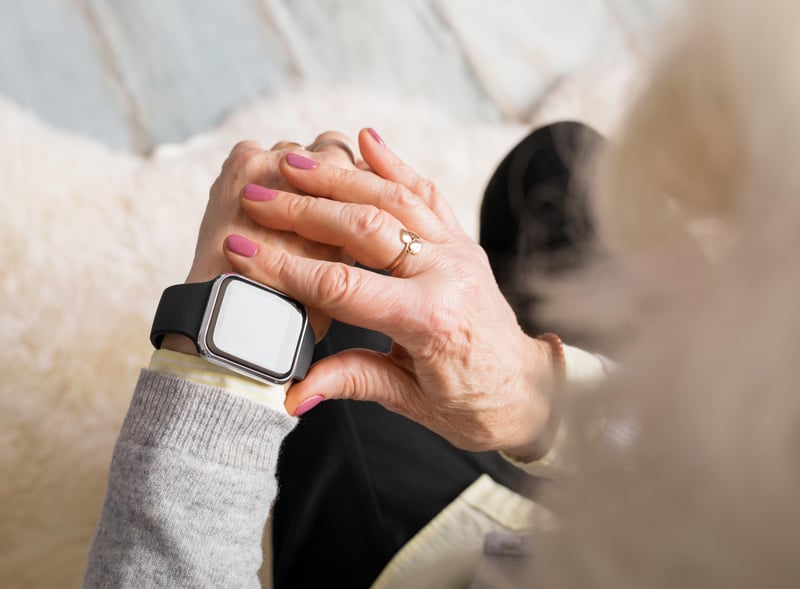Manténgase sano!

- Denise Mann
- Posted February 22, 2023
Could Your Smartwatch Interfere With Your Pacemaker?
If you're one of the millions of people with a pacemaker or an implantable defibrillator to help control abnormal heart rhythms, certain health-tracking devices may do more harm than good.
Smartwatches, rings or scales that emit electrical currents can interfere with these lifesaving implantable heart devices, causing them to malfunction, a new study suggests.
"While the electrical current applied to the body by the gadget is imperceptible by the patients, our work indicates it might be sufficient to confuse pacemakers, implantable cardiac defibrillators and cardiac resynchronization therapy devices,"said study author Benjamin Sanchez Terrones. He is an assistant professor of electrical and computer engineering at the University of Utah.
At issue are wearable smartwatches, at-home smart scales, and smart rings that use bioimpedance, a sensing technology that emits a very slight electrical current into the body.
With smartwatches like the Samsung Galaxy Watch 4 or the Fitbit Aria 2 smart scale, electrical current flows through the body so a sensor can determine body composition, such as muscle or fat mass. Smart rings like the Moodmetric smart ring use bioimpedance to measure stress. Not all smart devices use bioimpedance sensing technology.
The researchers evaluated how bioimpedance affects three implantable cardiac devices -- from Medtronic, Boston Scientific and Abbott -- via benchtop testing, which teases out flaws in devices before they are implanted, and in human-simulation models.
They found that even slight electrical currents from these gadgets can interfere with and sometimes confuse cardiac implantable devices. What's more, the level of electrical interference exceeds U.S. Food and Drug Administration-approved values for cardiac implantable electronic devices, the researchers said.
Pacemakers send small electrical impulses to the heart when it is beating too slowly, while implantable cardioverter-defibrillators act as a pacemaker and can shock the heart to restore a regular rhythm. "The findings do not convey an immediate or clear risk to patients who wear the trackers, but the different levels emitted could result in pacing interruptions or unnecessary shocks to the heart,"Sanchez Terrones said.
The study can't say how specific cardiac devices will be affected by interference from smart devices as the specifics vary, and this information is not public. "Case-by-case studies will be needed,"he said.
Most implantable cardiac devices do carry warnings about the potential for interference with a variety of electronics. "No public information is available on the effect these gadgets may have specifically on patients with implantable electronic devices,"Sanchez Terrones said.
The study appears online in Heart Rhythm, in advance of the April print issue.
Other experts point out that these risks are real and something folks with implantable heart devices should consider.
"Wearable devices are a new addition to the inventory of electromagnetic interference sources, and the best approach when such new technologies become available is to use caution and have the devices extensively tested in real-time to assess if there is any negative interaction whatsoever,"said Dr. Miguel Leal. He is an associate professor of medicine at Emory University School of Medicine in Atlanta and chair of the American Heart Association's electrophysiology and arrhythmia committee.
A pacemaker-dependent patient could have the pacemaker function temporarily inhibited by over-sensing electromagnetic interference or noise, leading the device to withhold lifesaving pacing, Leal said. In this scenario, a person could faint. In extreme cases, such as even more prolonged pauses, sudden cardiac death might occur, he said.
If an implantable cardioverter-defibrillator (ICD) over-senses electromagnetic interference, it might trigger a series of inappropriate and painful shocks.
"These types of events, which can also occur in other instances of device malfunction, could cause significant physical and psychological effects, including post-traumatic stress disorder,"Leal said.
Both scenarios are theoretical and likely very rare, he said. "Given the novelty of the technologies involved, we are still learning about these risks and trying to quantify them in realistic terms to our patients,"Leal said.
He suggested that people with these implantable devices enroll in remote monitoring programs. "Devices receive continuous assessment by remote monitoring systems, as opposed to simply being evaluated during routine in-person clinic checks," Leal said.
It's better to be safe than sorry, agreed Dr. Paul Maccaro. He is vice chairman of cardiology and director of the electrophysiology lab at Huntington Hospital-Northwell Health in Huntington, N.Y.
"People with these implantable heart devices should avoid smart gadgets that measure body composition," Maccaro advised.
The risk of electromagnetic interference with implantable heart devices is not new.
"We have known that metal detectors at airports cause interference, and we advise patients to keep their cellphone 6 inches away from their devices, and now the new study shows that some smart devices can also pose risks,"he said.
Calling the study "provocative,"Dr. Deepak Bhatt said that smartwatches may interfere with pacemakers and implantable defibrillators. He is the director of Mount Sinai Heart and professor of cardiovascular medicine at the Icahn School of Medicine in New York City.
"Additional studies are needed to more precisely delineate the risks and whether there are patients with pacemakers or defibrillators who should avoid wearing these devices,"Bhatt said, adding that manufacturers and regulators will need to review these data.
More information
The American Heart Association has more on devices that may interfere with ICDs and pacemakers.
SOURCES: Benjamin Sanchez Terrones, PhD, assistant professor, electrical and computer engineering, University of Utah, Salt Lake City; Miguel Leal, MD, associate professor, medicine, Emory University School of Medicine, Atlanta, and chair, electrophysiology and arrhythmia committee, American Heart Association; Paul Maccaro, MD, vice chairman, cardiology, and director, electrophysiology lab, Huntington Hospital-Northwell Health, Huntington, N.Y.; Deepak Bhatt, MD, MPH, director, Mount Sinai Heart, and Dr. Valentin Fuster Professor of Cardiovascular Medicine, Icahn School of Medicine, Mount Sinai Health System, New York City; Heart Rhythm, Feb. 22, 2023, online







